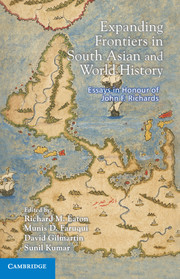Book contents
- Frontmatter
- Contents
- List of Contributors
- Foreword
- Introduction
- 1 At Empire's End: The Nizam, Hyderabad and Eighteenth-century India
- 2 The Ignored Elites: Turks, Mongols and a Persian Secretarial Class in the Early Delhi Sultanate
- 3 ‘Silk Road, Cotton Road or … Indo-Chinese Trade in Pre-European Times’
- 4 The Political Economy of Opium Smuggling in Early Nineteenth Century India: Leakage or Resistance?
- 5 Opium and the Company: Maritime Trade and Imperial Finances on Java, 1684–1796
- 6 The Mughals, the Sufi Shaikhs and the Formation of the Akbari Dispensation
- 7 Notes on Political Thought in Medieval and Early Modern South India
- 8 Becoming Turk the Rajput Way: Conversion and Identity in an Indian Warrior Narrative
- 9 Nature and Nurture on Imperial China's Frontiers
- 10 The Frontiers of Memory: What the Marathas Remembered of Vijayanagara
- 11 ‘Kiss My Foot,’ Said the King: Firearms, Diplomacy and the Battle for Raichur, 1520
- 12 Frontiers of Family Life: Early Modern Atlantic and Indian Ocean Worlds
- 13 Chinese Revenue Farms and Borders in Southeast Asia
- Publications
- Index
10 - The Frontiers of Memory: What the Marathas Remembered of Vijayanagara
Published online by Cambridge University Press: 05 January 2014
- Frontmatter
- Contents
- List of Contributors
- Foreword
- Introduction
- 1 At Empire's End: The Nizam, Hyderabad and Eighteenth-century India
- 2 The Ignored Elites: Turks, Mongols and a Persian Secretarial Class in the Early Delhi Sultanate
- 3 ‘Silk Road, Cotton Road or … Indo-Chinese Trade in Pre-European Times’
- 4 The Political Economy of Opium Smuggling in Early Nineteenth Century India: Leakage or Resistance?
- 5 Opium and the Company: Maritime Trade and Imperial Finances on Java, 1684–1796
- 6 The Mughals, the Sufi Shaikhs and the Formation of the Akbari Dispensation
- 7 Notes on Political Thought in Medieval and Early Modern South India
- 8 Becoming Turk the Rajput Way: Conversion and Identity in an Indian Warrior Narrative
- 9 Nature and Nurture on Imperial China's Frontiers
- 10 The Frontiers of Memory: What the Marathas Remembered of Vijayanagara
- 11 ‘Kiss My Foot,’ Said the King: Firearms, Diplomacy and the Battle for Raichur, 1520
- 12 Frontiers of Family Life: Early Modern Atlantic and Indian Ocean Worlds
- 13 Chinese Revenue Farms and Borders in Southeast Asia
- Publications
- Index
Summary
INTRODUCTION
Historians have long struggled with the task of interpreting narratives that although written in the past tense are yet hard, if not impossible to reconcile with each other or indeed, the modern historical sense of there having been a singular past. The usual response has been to ‘mine’ them for historical knowledge as ‘such consciousness is not always visible and has to be prised from sources which tend to conceal it’. Alternatively, we can treat historical texts as literary ones and allow them all to benefit from the suspension of disbelief available to the literary understanding. Thus, Hayden White proposed in 1966 to treat historical explanation as something that ‘can be judged solely in terms of the richness of the metaphors which govern its sequence of articulation’ because, after all, ‘there is no such thing as a single correct view of any object’.
Gabrielle Spiegel, an important scholar of pre-modern narrative has sought a middle ground between these opposed positions arguing that the ‘alternative between seeing language as either perfectly transparent or completely opaque is simply too rigidly framed’. She then pointed out a vital difference between the way that historians and literary scholars needed to approach texts.
But historical contexts do not exist in themselves; they must be defined, and in that sense constructed, by the historian before the interpretive work of producing meaning, of interpreting the past, can begin..…
- Type
- Chapter
- Information
- Expanding Frontiers in South Asian and World HistoryEssays in Honour of John F. Richards, pp. 255 - 274Publisher: Cambridge University PressPrint publication year: 2013



